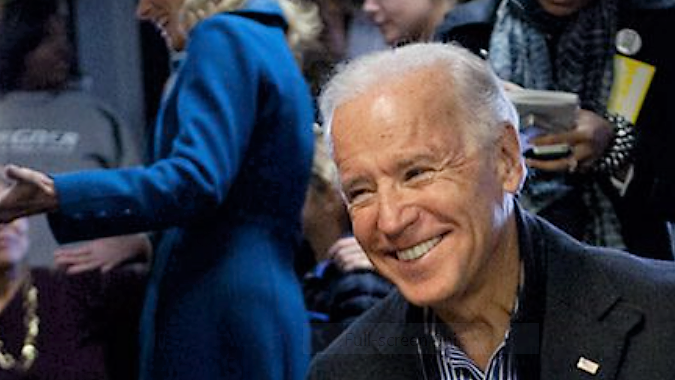Change Yet Comfort: Joe Biden’s Formula to Win the Nomination

Every Presidential election poses this question: Do voters want change, or do we want reassurance about the future? Change and comfort may seem at odds, but that doesn’t stop most of us from wanting both in a Presidential candidate. The candidates who win are the candidates who offer a balance. The problem with Bernie Sanders is that he offers change without comforting enough of us – including everyday Americans who are not part of the rich one percent.
In the 1960 election, John F. Kennedy offered change from President Eisenhower through a combination of youth with brainy communication skills that belied Kennedy’s age. Kennedy was the Pete Buttigieg of the time. Eisenhower, on the other hand, was old. In 1960, the average life expectancy in the United States for white men – those with white privilege instead of the racism that oppressed African-Americans – was just 67. Meanwhile, Eisenhower was the first President to turn 70 in office. And though Ike was a good communicator on the battlefield, he was a miserable communicator on television, as he himself acknowledged.
Kennedy represented a sea change, and his task was to reassure Americans he could keep the ship steady. He had three things going for him: First, his unflappable performances against Nixon at the 1960 debates. Second, Nixon had already carried the name “Tricky Dick” from his 1950 U.S. Senate race in California against Helen Gahagan Douglas. Nixon was not the reassuring figure that a Vice President of a popular President should be. Third, Kennedy and Nixon presented a minimal difference in the ideology compared to opposing nominees today. JFK had actually donated to Nixon’s 1950 campaign against Gahagan Douglas.
Kennedy, not Nixon, pulled off the combination of change and comfort.
The 2008 election, like many others, tells a similar story. Barack Obama shared Kennedy’s youth. Obama, for that matter, was newer on the national scene than Kennedy had been. Obama also had to break a glass ceiling to the Presidency that previous African-American candidates, Shirley Chisholm and the Rev. Jesse Jackson, were unable to break. John McCain, in contrast, had been on the national scene for decades and reassured Americans through courage and patriotism not even Democrats could doubt.
During the campaign, Obama showed us why he had earned the nickname “No Drama Obama.” McCain, meanwhile, had a penchant for risk that ignited drama. He chose Sarah Palin. Then he suspended his campaign – as voters clamored for reassurance – when Lehman Bros. collapsed and accelerated the worldwide recession. In my new HarperCollins book, The Turn-On: How the Powerful Make Us Like Them, I call reliability is an essential trait to likeability.
Obama, not McCain, was the reliable candidate. Obama, not McCain, pulled off the combination of change and comfort.
Fast forward to 2020 and Bernie Sanders’ revolution against the establishment and financial elite. Super Tuesday destroyed the revolution’s credibility. Sanders was supposed to turn out young voters as never before. But youth turnout declined. The engine of Joe Biden’s overwhelming victories was not establishment money. Biden’s campaign had hardly any money to spend. Rather, Biden’s engine consisted of African-American voters who, generally speaking, are not the financial elite.
When a journalist asked Sanders if he should label himself a New Deal Democrat rather than a Socialist, Sanders said no. Authenticity, another trait of likeability I examine in my book, is certainly Bernie’s calling card. But authenticity does not automatically beget political wisdom. To older voters who sided with Hillary Clinton over Sanders in 2016 and with Biden over Bernie this week, the New Deal has a cache that democratic socialism does not. Voters saw in Sanders another disconnect from reality – the opposite of comforting. And why would Bernie praise literacy as a bright spot in Fidel Castro’s tyranny the month before the Florida primary? Authentic again, but to quote a recurring line from Amy Klobuchar about Donald Trump: Who does that? Bernie’s comments, and his doubling down on them once the firestorm began, only underscored his riskiness.
As Super Tuesday proved, Democratic voters don’t see the same risk in Biden. On the campaign trail, the astonishing reliability of Biden’s empathy outweighs any doubts that might come from his gaffes. His empathy comes across as authentic because voters know the tragedies he has survived.
Comforting though he may be, Biden would seem to lack the promise of change, or enough change compared to Bernie Sanders’ revolution. But compared to Trump’s carefree cruelty and unhinged tweets, Biden’s kindness and connection to Barack Obama’s legacy represents jaw-dropping change that would be far from it in any other election.
That’s how Joe Biden, whom I now support, offers the combination of change and comfort necessary to win Presidential elections. If Bernie Sanders does not reverse course to balance his revolution with reassurance – doubtful for a 78-year-old who has lived his entire life otherwise – he will lose the Democratic nomination and any subsequent opportunity to expand his revolution to success.
Steven Goldstein, www.stevengoldstein.com





